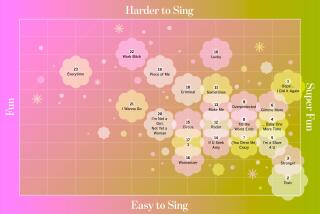China’s Karaoke Police Have a Request: Do It Mao’s Way
- Share via
BEIJING — With their control over newspapers, television, magazines and the Internet secure, censors in China are now turning their attention to the dim recesses of the nation’s karaoke parlors.
The state-run Beijing News reported Wednesday that the Ministry of Culture has issued new rules to prevent “unhealthy” songs from ringing forth in the singalong bars, which are so popular here that people joke that overseas, Chinese join church choirs only because they miss karaoke so much.
Most Chinese tunes are pretty tame by U.S. standards. So what songs might not pass Beijing’s crooners cut? A “Top 10 Unclean Song Contest” held a few years ago by Heaven and Earth People magazine might provide some clues.
Among those judged the most unclean was “Boat Tracker’s Love,” condemned for lyrics such as “I can’t wait for the sun to set so you can kiss me as much as you want to.” Those less inclined toward maritime themes might consider “Office” by Xuecun, with the line, “We spend a lot of nights together as you cheat on your husband by telling him you’re working overtime.”
Song Zhu, an 18-year-old student who enjoys belting out tunes by Taiwanese rap singer Zhou Jielun, thought the proposed rules sounded a bit intrusive.
“It would really bother me if I wasn’t allowed to sing a song I liked,” Song said as she stood in front of the Cash Box karaoke parlor in Beijing, fiddling with her cellphone. “I’d be especially peeved if I’d practiced and got really good at it.”
The government has picked three mid-size cities, Wuhan, Zhengzhou and Qingdao, to test the new program under which member businesses will choose songs from a central database. The program, which the government says also will help safeguard intellectual property rights, may go nationwide if implementation in the test cities proves successful.
“All the songs in the database for use by karaoke parlors and consumers need to be censored” to ensure their content meets government standards, Liang Gang, director of the Cultural Market Development Center of the Ministry of Culture, told state media.
China’s monopoly Communist Party faces a challenge serenading its youngest charges, many of whom were weaned on a diet of pop music, global fashion and consumer choice and view the 1989 Tiananmen Square crackdown as ancient history.
By the standards of the West, young Chinese study hard, are well behaved and generally obey and respect their elders. Viewed through the prism of Chinese history, however, with its Confucian ideal of near-absolute obedience to authority, young people today are pushing the envelope.
In recent years, Beijing has launched a wave of initiatives to try to reach the 283 million Chinese ages 15 to 30, with limited success.
These efforts include restrictions on the appearance of racy clothing, cleavage or purple hair on state-run television; a government-produced rap rendition of Mao Tse-tung’s teachings; filial piety contests; and “clean” online games in which model soldiers darn socks to earn the ultimate prize, a signed virtual copy of Mao’s Little Red Book.
Tens of millions of Chinese vibrate their vocal cords in karaoke establishments each year in what some estimate is a $5-billion industry. At $6 for a private sound room at Cash Box for an entire weekday evening, this relatively inexpensive form of entertainment is widely accessible to lower-class workers and middle-class students, in addition to well-heeled businesspeople.
Some analysts were almost dismissive in discussing the government’s efforts.
Hung Huang, chief executive of China Interactive Media Group and former publisher of Seventeen magazine in China, said the regulations raised some intriguing possibilities. With a little added technology, a karaoke machine could be programmed to emit a high-pitched screech every time a banned song was played, ruining people’s singing reputations and their social standing.
“I think it’s hysterical,” she said. “I’m really glad the Ministry of Culture is providing us with such comic relief.”
Others question whether Beijing’s karaoke vetting plan will work, given the lightning speed at which popular culture changes and how lead-footed government officials tend to be in any country.
“In terms of protecting copyrights, it’s not completely senseless,” said Miao Di, a professor at Beijing’s Communication University of China. “But it’s difficult to put it into practice. How can they make sure they have the latest hits in the database?”
Others see an ulterior motive.
“I think it’s a policy to control content, but also to control who gets the money,” said Tao Wei, a producer of youth-related plays and films for the government.
“If a new song wants to enter the system, you have to pay and the government gets the proceeds.”
Beijing says it will not charge those using the database, although karaoke parlors would have to pay applicable copyright fees. That step is part of the government’s plan to “gradually” solve intellectual property rights disputes among the recording industry, artists and karaoke parlors.
“They may have multiple motives,” said Zhang Xingshui, director of the Beijing Kingdom law firm, who said he wasn’t a big fan of karaoke himself.
“They say it’s for intellectual property rights protection, but it could be censorship in another form.”
Media executive Hung said the government deserved credit for publicizing the proposed rules. A few years ago, it might have simply raided karaoke parlors without giving them any idea what rule they had violated.
But many regulations and laws governing media are so broad that they tend to leave lots of discretion for those charged with implementing them, Hung said.
“It’s a question of lawmakers catching up with modern times,” she added.
Yin Lijin in The Times’ Beijing Bureau contributed to this report.
More to Read
Sign up for Essential California
The most important California stories and recommendations in your inbox every morning.
You may occasionally receive promotional content from the Los Angeles Times.













